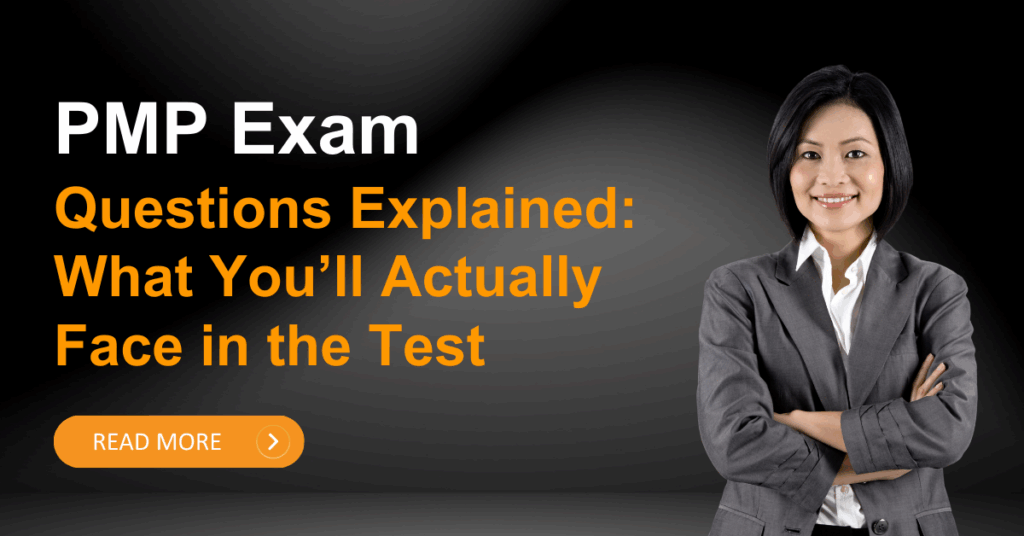PMP Exam Questions Explained: What You’ll Actually Face in the Test

Preparation for the PMP exam questions may appear challenging if you do not know what the test is like. The Project Management Professional (PMP) test is a well-respected credential in the field, and it goes beyond textbooks. The test not only examines how you will apply project management principles to real-world situations but also how you approach real-world circumstances.
The PMP includes case studies and multiple-choice questions. Technical skills and leadership skills will be included. We’ll explain the style of PMP exam questions in this article, give you examples, and give you advice so you’ll have an idea of what to expect on test day.
Table of Contents
Types of PMP Exam Questions
1. Multiple-Choice Questions
The most popular question type is multiple-choice questions that test how well you know key concepts. You have four options for each question, but just one is correct. The questions evaluate your recall of project management steps, formulas, and definitions.
2. Situational Questions
These questions depend on various conditions. You will receive a project scenario and have to select the best course of action. These PMP questions test your leadership, decision-making, and practical knowledge of project management practices.
3. Drag-and-Drop Questions
Here, you’ll align steps, phases of a life cycle, or ideas. Drag-and-drop PMP questions test how you align process groups and workflows with theory.
4. Hotspot Questions
Hotspot questions ask you to click on a diagram, graphic, or chart to find key items. Hotspot questions check how well you see and remember project materials.
5.Questions on Agile and Hybrid Scenarios
As PMP covers Agile and hybrid methodologies, you will have PMP exam questions on Scrum, Kanban, and iterative project management. These mirror current best practices among project managers.
Difficulty Level of PMP Exam Questions
The PMP exam is challenging because it emphasizes application over theory. Instead of asking, “What is project scope management?”, you might see a question like:
“A project manager discovers scope creep mid-project. What’s the best course of action?”
This style ensures you can apply your knowledge in real-world settings. Around 50% of the exam questions are situational, making critical thinking essential.
Example PMP Exam Questions
Here are a few sample questions you might encounter:
Question: A stakeholder requests a major change late in the project. What should the project manager do first?
- Approve the change immediately
- Reject the change request
- Evaluate the impact and update the change log
- Escalate to the sponsor
Correct Answer: C. Evaluate the impact and update the change log.
How to Prepare for PMP Exam Questions
- Study the Exam Content Outline (ECO): PMI’s roadmap aligns your study program.
- Practice with Sample Tests: Taking a few PMP test questions under timed conditions improves pacing and reduces test nervousness.
- Strengthen Weak Areas: Highlight agile, managing risk, and collaboration with stakeholders.
- Use of New Material: Make sure course materials include current PMBOK Guide and Agile methods.
What Kind of Roles Require PMP Certification?
PMP certification is considered the best certification for project managers worldwide. Certification indicates that a person is well aware of the PMBOK framework and is equipped to manage intricate projects under real-life circumstances. The people who prepare for the PMP test generally aim for those jobs that require leadership, organizational, and problem-solving expertise.
Typical roles that require PMP certification include:
- Project Manager: In charge of managing a project from start to finish, including planning and delivery. PMP certification shows that you can manage budgets, teams, and deadlines well.
- Program Manager: Manages several projects under a program. Hiring employers favor PMP-certified professionals who have expertise in managing dependencies and business goal alignment.
- IT Project Manager: In the workplace, system upgrades, system migration, and software projects are managed by PMP-certified managers. Agile and predictive practices are utilized.
- Project Coordinator: Typically an entry position, but PMP-certified candidates shine because they prove themselves fit for leadership roles.
- Operations Manager / PMO Lead: The role for these names incorporates elements of strategy, governance, and projects delivering measurable business value, and these are PMP test questions.
Prepare with Certify360
With Certify360, you’ll find it easier to get exam-ready using real-world practice questions, up-to-the-minute study guides, and timed practice tests. Our training covers every detail of the examination, from Agile to risk management, and gets you test-day ready.
Get access to Certify360’s exam prep courses and practice questions today, and take the next step in your project management career.
FAQs:
Q1. How many questions does the PMP exam contain?
It has 180 test questions. You have to answer them in 230 minutes and have to manage time.
Q2. Are all PMP exam questions multiple-choice?
No. PMP questions have various forms such as multiple-choice, drag-and-drop, hotspot, and scenario. They include Agile, hybrid, and predictive approaches.
Q3. How challenging is the PMP exam?
PMP questions on the test are challenging because the great majority of questions are situational. You’re required to apply knowledge, not recall facts.
